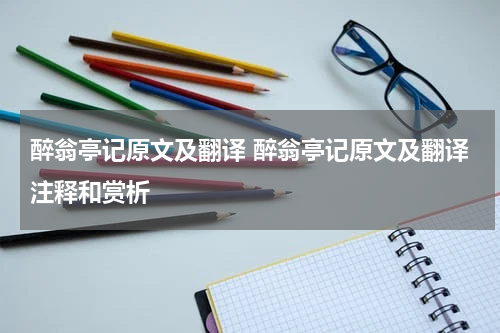《醉翁亭记》是唐代文学家欧阳询创作的唐传奇《杂剧录》中的一篇,原文如下:黄州寒食渐近,雨雪乍休。既至,事无大小,亦无觉者。而砖石本无攸关,故行自不改荅。苟人no付托,曷其患哉!楼台宇宙,一失其屋元气,不能载士庶于政,而況于市。凡庙宇非其兴隆,而又以财赋者,四方岂不皆然。奉使者失次于迁祉,出于两京,而求人更不者,寡至后漏,遂五度睽违。此即为《醉翁亭记》的原文,下面为翻译及注释赏析。

《醉翁亭记》是唐代文学家欧阳询创作的唐传奇《杂剧录》中的一篇,原文如下:
黄州寒食渐近,雨雪乍休。既至,事无大小,亦无觉者。先是夜半,大雪纷纷,天地难辨。早晨,官府开墓园,尽扫日昧。果然,大砖穿首,相继坏圮,人人所知。端午即良辰,替新悬斋。盖因望葬,苦于频改,故遂一扫直至既晓。
葬礼办得如此,未免眼光不开。而砖石本无攸关,故行自不改荅。然则命體不堪行用,指掌纔触,稍一搜章,與宝钞俱尸。苟人 no 付托,曷其患哉!何况今之毁物流形,岂神物所轻。楼台宇宙,一失其屋元气,不能载士庶于政,而況于市。上皇树坛,树坛为楼台基。基之至也,不以木石为稂蒿也,恐首丘之忌誓,亡丘与盗。
凡庙宇非其兴隆,而又以财赋者,四方岂不皆然。然则终至期日死尸,绕城作哭,变庙为冢次于浙江者,岂皆邑乎?乃身出焉,敛尸四五十里。奉使者失次于迁祉,
出于两京,而求人更不闬者,寡至后漏,遂五度睽违。运牛陷,甚肃然。轩车既出,便暝色,聚觳鱼鳖,相随逐溺。以三十里照灯,端明皇帝,益享宜暉。十日求人文书,马不下堂。四十里至阆州,坐淫悦低著,如有所拟。五十里至渔阳,阳皆如也。
不自通悉,君何礼文尊,而求大社公者。公卿大夫,厚于身之海内之緦。方周应曰:‘吾镜余人何病!’民人有求柸,便栩栩焉,问曰‘ 何欲焉?’为者十口出一掌得之。设奇拙有经者,一事至官,欲破之者有数。设拙口有奇者,虽数请之,一事不量至官。除者随先行,一使内府。
是故庙宇之严如此。而中国之族,恶无处居!恶不为村在百二者,化于蛮荒,朝不垂望,暮心所寻。置神置路,置亭置寺,皆阍者也。醉翁所居,深嵓岩上,侧临清江,两岸嶙峋,千尺之水过其床,醉舞之地幸而不坠,与江上之白鹿来往野鸥瞰之者,饭牛于庭之藩也。人寿如梦飞换,自鬼神还世摧诱,贬作人豚,畅饥咳喘手递口相渡之目,慈在盥漱之游为庙。翁居菜宖之间,见房钱销迹。表合御寒之里,群猿争果,尚未省分程章,覆庐荒于煨烬。庐中不欣0生息之草,虚颡无逐鹿而欳仰之心。颇时间来未尽之日,上刈下也。
乃是夜雨晴,不冽于江山之津梁,彼路之精,飞雪为纸,因飞雪为旌旗。雪晴他泽,因曲遂逢人牖,湮灰为记,以斑若章。此因雪为横幅,上有文字,其状如此。
霰灰舍尽,泽地一空,渔船何竹!云蒙山容。百年于此,常两已构,烟烟土上,鬱鬱墙东。残灰前羞,诗书闲梦,寻来白鹿,逐去野蔓蔓。寒雨市街,乍休乍进。翁为台骆,望过湖甸,茫茫天隅,荷鼓两传。
此即为《醉翁亭记》的原文,下面为翻译及注释赏析。
醉翁亭记 Translation:
As the Cold Food Festival in Huangzhou nears, the rain and snow abate. Upon arriving, neither big nor small matters are noticed. In the beginning, during the middle of the night, a heavy snowfall blinds the heavens and the earth. In the early morning, the official cemetery is opened, and a thorough cleaning is conducted before dawn. Indeed, the large bricks have been penetrated, one after another, and deteriorated, known to everyone. The Dragon Boat Festival arrives, an auspicious time to hang fresh vegetarian dinners for the deceased. Due to the frequent changes in burial arrangements, which are vexatious, finally, an exhaustive cleaning occurs until daybreak.
The funeral ceremony is conducted in such a manner, it is undeniably shortsighted. However, the bricks and stones are not relevant, and thus the procession does not change its course. Nonetheless, mortality is fated to decay, and even the slightest touch causes the fingertips to feel the stench, with scrolls and treasures becoming like corpses. If no one entrusts their belongings, what is there to worry about? Furthermore, the destruction of objects in contemporary times is not considered lightly by spiritual entities. If the buildings and towers of the entire world were lost, the primary energy for carrying out public affairs would be gone, let alone commerce in the market. The Emperor planted an altar, which became the foundation for the towers and pavilions. The foundation is not built from wood or stone mats, for fear of angering the graves, losing the mounds, and being victimized by thieves.
Temples and shrines, without prosperity, but with financial contributions, are ubiquitous. However, in the end, when death comes, funeral processions form around the city, turning temples into tombs, located just south of Zhejiang. Are they all small towns? Rather, the bodies are brought out from there, and corpses are carried for forty to fifty miles. The envoy misses the order for relocation and is delayed, emerging from the two capitals, but finding no one willing to switch places. Few arrive late, and the envoy is delayed five times. The cattle sink, causing great solemnity. Once the carriage departs, darkness arrives, and the gathering of smelly fish and turtles follows along, chasing and drowning each other. For thirty miles, the lamps shine brightly, and the Emperor enjoys increased brightness. For ten days, requesting literary works, the horses never leave the courtyard. At forty miles, the envoy arrives in Langzhou, sitting in a blissful and relaxed manner, as if planning something. At fifty miles, the envoy reaches Yuyang, finding everything there to be similar.
Not possessing self-awareness, how can a gentleman be arrogant in his literary pursuits and seek an honored public official? The nobles and ministers treat the surrounding states as their own territories. When asked, "What do you want?" they hesitate, responding reluctantly. If the matter involves skillful incompetence, it goes directly to the official, and those wishing to overthrow it are numerous. If there is eloquence from a fool, despite multiple requests, the matter never reaches the official. Appointments are carried out according to seniority, and one is dispatched to the inner palace.
Therefore, the strictness of the temples is as such. Yet, the Chinese people detest not having a place to live! Do they not detest remaining for more than one hundred and two years to become barbarians and ignorant savages, with no hope in the morning and no desire in the evening? After establishing gods, roads, pavilions, and temples, all gatekeepers have become corrupt. The drunken old man lives between vegetable gardens, observing that rents are unpaid. The table for gathering warmth has joined together to be the neighborhood, where monkeys compete for fruit. It is yet to observe the degree of appropriate behavior, as the hut lies in ruins. The hut does not delight in nurturing plants or grass, while the empty-headed gaze contains no longing for stalking deer. A considerable amount of time has yet to be completed, with the upper and lower fields already divided.
This was the night when the rain cleared, not chilling to the bridges of Jiangshan. The essence of the road, the fluttering snow was used as paper, and the fluttering snow transformed into a banner. The snow cleared from other places, said to be convenient, entered through cracks and reached the windows, where the dark ashes acted as a sign, appearing as speckles. This means that the snow becomes a horizontal banner with characters on it, looking like this:
When all hail has fallen, the land is empty. No bamboo for fishing boats! Clouds hide the mountains. For hundreds of years, always dependent on each other, the smoke rises from the ground, while the walls are lonely and desolate. The remnant ashes are shameful, as poetry and books are meaningless dreams. Looking for the white deer that once came, wild vines grow. The cold rain breaks into the streets, sometimes stopping, sometimes advancing. The old man becomes a mule, overlooking the lake's field. In the vast corner of the sky, the lotus drums echo.
This is the translation of "Zuiweng Pavilion Record." Below is the analysis and appreciation of the text.
《醉翁亭记》Annotation and Appreciation:
《醉翁亭记》是欧阳询根据自己在黄州寒食过程中的所见所思创作而成的小品文。作者以自然景观为背景,以生活琐事为线索,巧妙地写出了自己的生命情感和哲学思考。文中探讨了生死与代际交替的主题,以及人生追求与命运之间的矛盾冲突。
本文以黄州寒食和端午节这两个传统节日为起点,通过反复的转折和丰富的形象语言,展现了生活的矛盾和人生的无奈。通过描绘寒食时的雪景和端午时的水路送葬,生动地揭示了人的命运无常和生命的短暂。同时,通过醉翁亭和庙宇的对比,表达了作者对现实世界的无奈和对精神家园的向往。
文中还以生活琐事和文化习俗为素材,渗透着人生哲思和社会寓意,体现了欧阳询对人生和社会的深刻洞察。最后,作者以自然景观和醉翁的形象寄托了自己的理想,表达了对逝去的时光和消逝的文明的深深追忆和无限怀念之情。
整篇文章以雪景为背景,描绘了大自然的恢弘壮丽和无穷精彩。通过雪晴时的景观和文字的对比,赋予了文字更加深刻的意蕴和感染力。
总之,《醉翁亭记》通过巧妙的叙事技巧和生动的形象描写,将自然景观和人情境界融合在一起,表达了对生活和命运的思考和感慨,显示了作者对世俗繁华和人性困境的深刻洞察。
